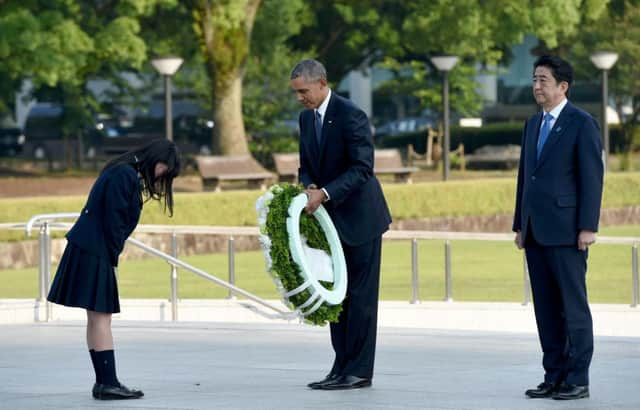'˜Death fell from the sky' says Barack Obama at Hiroshima visit


“Death fell from the sky and the world was changed,” Obama said, after laying a wreath, closing his eyes and briefly bowing his head before an arched monument in Hiroshima’s Peace Memorial Park that honors those killed on August 6, 1945, when US forces dropped the bomb that ushered in the nuclear age. The bombing, Obama said, “demonstrated that mankind possessed the means to destroy itself.”
Obama did not apologise, instead offering, in a carefully choreographed display, a simple reflection on the horrors of war and his hope the horror of Hiroshima could spark a “moral awakening.” As he and Japanese Prime Minister Shinzo Abe stood near an iconic bombed-out domed building, Obama acknowledged the devastating toll of war and urged the world to do better.
Advertisement
Hide AdAdvertisement
Hide Ad“We stand here in the middle of this city and force ourselves to imagine the moment the bomb fell ... we listen to a silent cry.” Obama said.
A second atomic bomb, dropped on Nagasaki three days later Hiroshima, killed 70,000 more.
Obama also sought to look forward to the day when there was less danger of nuclear war. He received a Nobel Peace Prize early on his presidency for his anti-nuclear agenda but has since seen uneven progress. “We must have the courage to escape the logic of fear and pursue a world without them,” Obama said of nuclear weapons.
The visit presents a diplomatic tightrope for a US president trying to make history without ripping open old wounds. He did not apologise for the attack, which is viewed by many in the US as having hastened the end of World War II; others have called it a war crime that targeted civilians.
Critics believe Obama’s mere presence in Hiroshima will be viewed as an apology for what they see as a justified attack. But he has also drawn praise from those who see it as a long overdue gesture needed to heal old wounds.
Obama touched down in Hiroshima after completing talks with world leaders at an international summit in Shima, Japan.
Those who come to ground zero at Hiroshima speak of its emotional impact, of the searing imagery of the exposed steel beams on the iconic A-bomb dome.